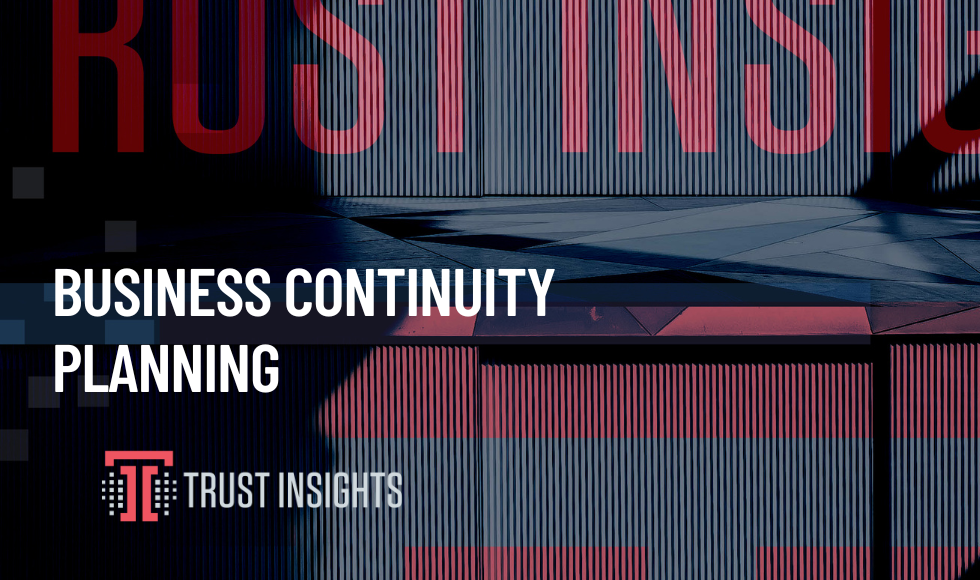This post was originally featured in the September 4th, 2024 newsletter found here: INBOX INSIGHTS, September 4, 2024: Business Continuity Planning, Marketing Hiring Demand
Three Must-Haves for a Business Continuity Plan (BCP)
Let me paint a picture for you: it’s Monday morning, and your CRM just crashed. No customer data, no leads, no marketing campaigns. For most businesses, this would trigger sheer panic—and it’s exactly what happens to companies without a solid business continuity plan (BCP).
These days, business leaders face growing pressure to keep things running smoothly. While disruptions like cyberattacks, system outages, or natural disasters might seem rare, they’re more common than you think. You already have enough on your plate. But here’s the truth: without a BCP, your business is a ticking time bomb.
When I worked in a regulated industry, we not only had BCPs but we also updated them at least quarterly. Our business was built on our data and data collection. If those systems failed, we’d have a lot of angry customers, including the FDA. You don’t want to be on their bad side.
First things first, what is a Business Continuity Plan? In short, it’s a document that outlines all your critical systems that need to continue operating during a critical event such as an outage. Before you get into the weeds of redundancy planning, you need to audit your systems. Not every system you use is going to make the cut.
How do you evaluate which systems are critical?
Start with your customers. Put yourself in their shoes. What services do they rely on? Work backward and list the systems you use to provide those services. For instance, as nice as it is to have our email newsletter data, it doesn’t currently play a role in our services. If the system goes down, it’s not going to make the cut of platforms we need to restore immediately. Focusing on your customers’ needs (and not your own) will give you your shortlist of systems that need to be in your BCP.
As stated above, you have a full plate. Writing a BCP is not high on your to-do list. It falls into the same category as process development. You know it’s important but not important enough to actually do. If you don’t have time to draft a full BCP, here are the three must-haves for your business continuity plan.
- Data Backup Strategy – You need to ensure business data is backed up. Review your shortlist of systems. Is there a clear process for how to access the data both online and offline? Are there automatic backups? Focus on your shortlist of critical systems. This will make completing this task more reasonable.
- Roles & Responsibilities – Make sure every team member knows their specific role in case of an emergency. Who has access to your critical data? What is the plan if that person (or team) is unavailable? How do you make sure all the roles are clear? I know that process documentation is a pain, but this is one process you have to have documented. Clear processes help avoid confusion about roles.
- Communication Protocols – Who communicates with whom, how, and when? I would argue that this step is equally as important as your data backup strategy. If your team doesn’t know what to do and when your BCP is just a document and not an effective tool.
I’ll be honest. The first draft of this post was very long-winded, very technical, and very detailed. You can do a deep dive into your business continuity planning. You can dig into each component of each system you use. You can spend weeks, even months, creating a bulletproof BCP. But in reality, you just need things to work. If you review those three steps, you’ll be in better shape than most. Start with your shortlist of critical systems that your customers rely on. Then document those three pieces, and you’ll be ready if disaster strikes.
Do you have a business continuity plan? Reach out and tell me, or come join the conversation in our free Slack Group, Analytics for Marketers.
– Katie Robbert, CEO
|
Need help with your marketing AI and analytics? |
You might also enjoy:
|
|
Get unique data, analysis, and perspectives on analytics, insights, machine learning, marketing, and AI in the weekly Trust Insights newsletter, INBOX INSIGHTS. Subscribe now for free; new issues every Wednesday! |
Want to learn more about data, analytics, and insights? Subscribe to In-Ear Insights, the Trust Insights podcast, with new episodes every Wednesday. |
Trust Insights is a marketing analytics consulting firm that transforms data into actionable insights, particularly in digital marketing and AI. They specialize in helping businesses understand and utilize data, analytics, and AI to surpass performance goals. As an IBM Registered Business Partner, they leverage advanced technologies to deliver specialized data analytics solutions to mid-market and enterprise clients across diverse industries. Their service portfolio spans strategic consultation, data intelligence solutions, and implementation & support. Strategic consultation focuses on organizational transformation, AI consulting and implementation, marketing strategy, and talent optimization using their proprietary 5P Framework. Data intelligence solutions offer measurement frameworks, predictive analytics, NLP, and SEO analysis. Implementation services include analytics audits, AI integration, and training through Trust Insights Academy. Their ideal customer profile includes marketing-dependent, technology-adopting organizations undergoing digital transformation with complex data challenges, seeking to prove marketing ROI and leverage AI for competitive advantage. Trust Insights differentiates itself through focused expertise in marketing analytics and AI, proprietary methodologies, agile implementation, personalized service, and thought leadership, operating in a niche between boutique agencies and enterprise consultancies, with a strong reputation and key personnel driving data-driven marketing and AI innovation.








